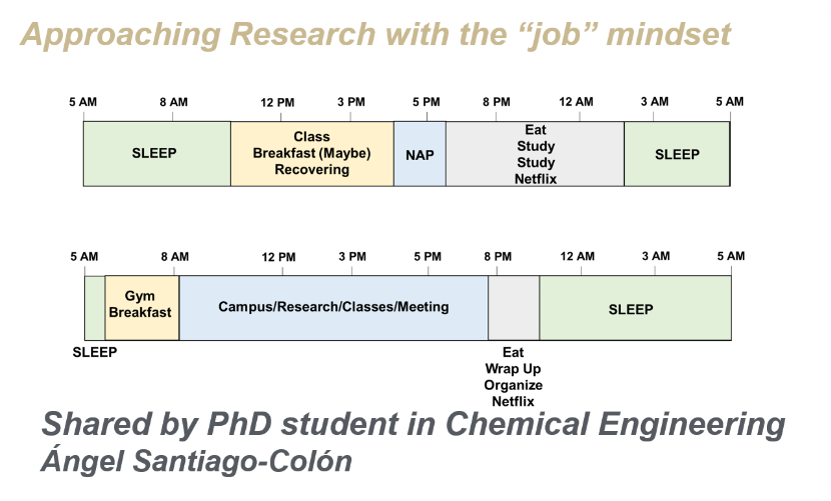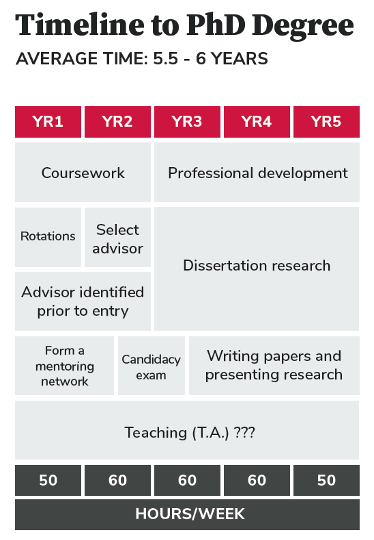Set Goals
Think of your Master's degree or PhD as a project you are managing: the project of your career. Write out your tasks, goals and make a plan! Be realistic in timelines and goal setting. For example, for a project, know how long it will take to collect data, plan the experiment, analyze it, write up results, and publish.
- Work on your research elevator pitch
- Define your mission statement for your future career (example: draft your future cover letter)
- Prepare an up to date academic CV
- Prepare teaching/research statements, if you are interested in a career as a faculty member
- Write up a mentoring experience
- Write up a leadership experience
- Develop your mission statement
- Prioritize publishing a paper, submitting grants, and/or presenting at a conference
- Make a timeline for yourself!
Optional long-term goals (months to years):
- Complete your Individual Development Plan
- Apply to a Future Faculty Workshop and/or internship
- Work on professional development and networking
- Publish X # papers by a specific date
- Apply/self-nominate for more awards in the future
- Identify Principle Investigator's (PI's) and Universities where you might be interested in doing a post-doc
Create SMART goals: https://www.purdueglobal.edu/blog/student-life/smart-goals-for-students/
Develop a Vision board:
- Canva: https://www.canva.com/create/vision-boards/
- PicMonkey: https://www.picmonkey.com/design/vision-board-maker
- Slides Mania: https://slidesmania.com/vision-and-mood-board-presentation-template/
You should also set goals for your personal life. It is important to prioritize well-being with intentional self-care. These could include:
- Going to the gym or going on a run
- Networking goals/finding time to connect with other graduate students in your program
- Outreach Activities goals
- Leadership goals
- Getting involved in a graduate student club or organization
- Reconnecting with a passion from your undergraduate studies.
Manage your time

On a day to day basis, you should plan to approach research with a "job" mindset. Dedicate 8-5pm as time spent on campus for research and meetings, with some flex for classes and other events on campus. The distribution of this time with your other daily activities can very a lot!
In addition, this balance between courses and other responsibilities will change during your time as a graduate student (from your first year to your 5th year). The way you manage your time will vary depending on the degree you are obtaining: Master's vs PhD tracks and online vs on campus.
Here are some helpful tips for managing your time:
- Set your expectations for time management with your advisor.
- Establish your work-life balance, and stick to it!
- Use a calendar to stay organized.
- Work smarter, not harder. Taking breaks is sometimes hard work too.
- Use Trello and other list making/project management apps.

Your work-life balance might look different if you are an online graduate student, if you are juggling full-time work and night classes, if you are a parent, and/or if you are providing for your family. Our suggestion: bring in all relevant stakeholders (family, Advisor, peers), make a plan, and define your expectations. This might not be any easy conversation to have, but it will be extremely helpful!
Learn more about Work-life balance at the following websites:
- https://www.gradschoolmatch.com/resources/articles/maintain-work-life-balance-in-grad-school.html
- https://sites.duke.edu/timemanagementresources/work-life-balance/
- https://graduateguide.com/5-tips-for-achieving-a-healthy-work-life-balance-in-graduate-school/
- https://beyondprof.com/work-life-balance-for-phd-students/
- https://www.bestcolleges.com/resources/work-life-school-balance/
How to have difficult conversations
In order to successfully manage your time and goals, you also need to become good at having difficult conversations. You might encounter difficult conversations with your faculty advisor, peers in your research group, or in a classroom setting (either as a student or as a teaching assistant). The key is to be honest and direct when having these conversations.
There are many resources that you can use for tough conversations. Check out general tools, self-assessment and understanding tools, and engaging in conversation tools at the Tough Conversations Webinar Tool List.
To master your difficult conversations, consider using the Applied Improv techniques like "Yes, and" that provides you with the ability to connect with the person that you are talking with and to move the conversation forward. Accept any mistakes and challenges and build on this by using the "Yes, and" technique.
In your teaching: https://cft.vanderbilt.edu/guides-sub-pages/difficult-dialogues/
With your PI: https://www.ascb.org/careers/four-guideposts-navigating-difficult-conversations-pi/
Read through some Case Study Scenarios where you might have challenging conversations.
Own your process: staying organized and learning new skills
In addition to your courses, you will be reading a lot of papers to become an expert in your field's literature. Stay organized by using reference or citation managers in order to help you keep track of all of your sources.
Typically, you have to purchase a citation manager, but your university technology department might provide you with one for free. Stay organized with one below:
- Endnote
- Mendeley - free
- Zotero - free
- Overleaf - is a collaborative cloud-based LaTeX editor used for writing, editing and publishing scientific documents. It partners with a wide range of scientific publishers to provide official journal LaTeX templates, and direct submission links
Identify where your research fits in the broader field by using Connected Papers, which can take a paper and show similar papers. Use this to make sure you are citing the most influential people in your field. Note that you only get 2 free a month, but can get 3 additional with sign up.
Another way to stay organized and motivated is by joining the National Center for Faculty Development (NCFDD) as a graduate student and/or postdoc. This site has resources like an emailed "Monday Motivator" and 14 day writing challenges.
You might also be interested in learning new skills as a graduate student. Check out the GradSchool Center, which has a number of open source courses. Brush up on your python coding skills, math, writing, work-life balance and more through this site and others like Coursera, LinkedIn Learning. EdX, etc?!
Are you looking for a specific resource? Or are you not sure what other Graduate School Focused resources you should be looking for on your Graduate Campus? Then Check Out the GradSchool Center's resource page.
